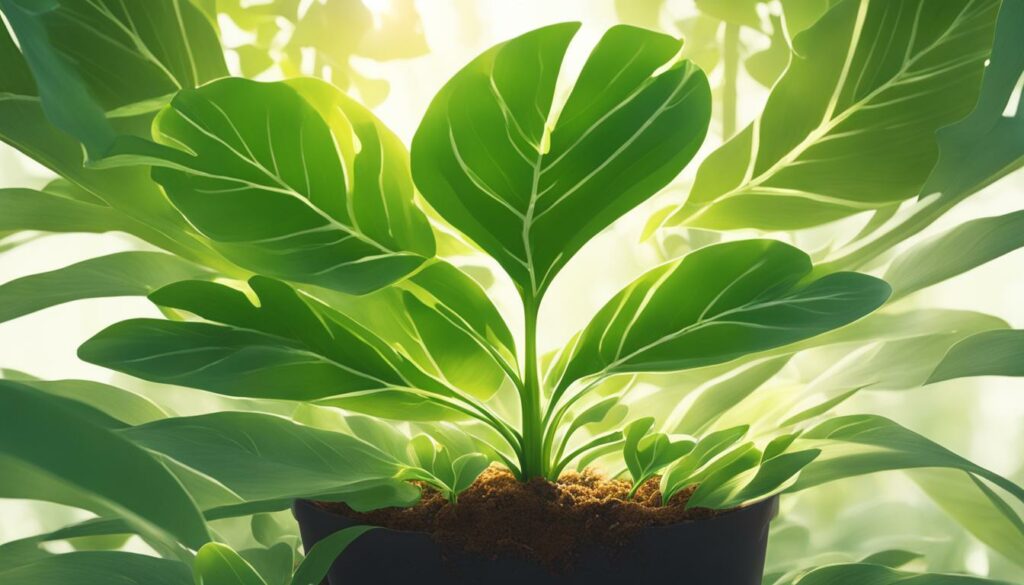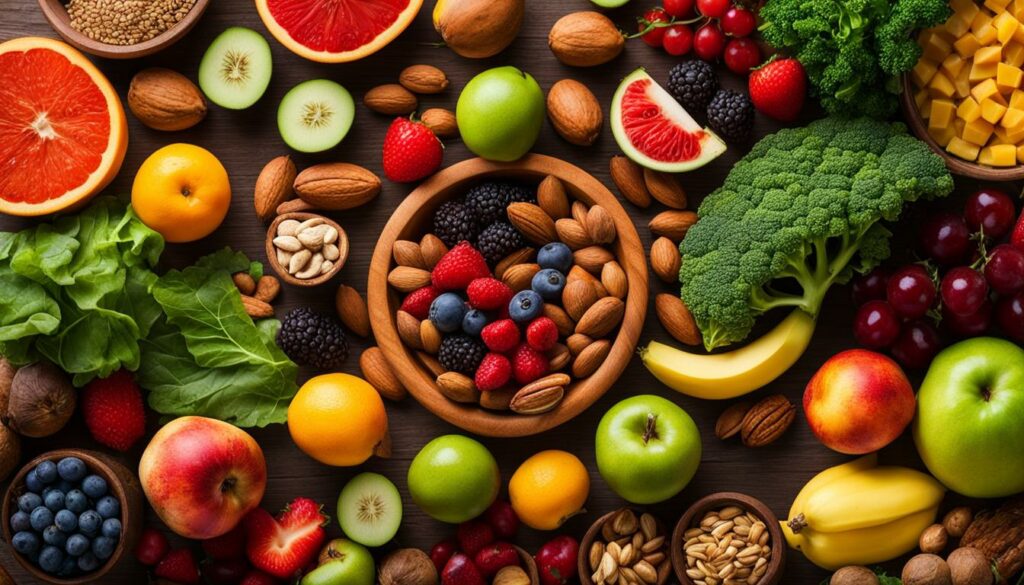Welcome to our article on the optimal dosage of Vitamin E for fertility. If you are trying to conceive or improve your reproductive health, Vitamin E can be a valuable addition to your daily routine. In this section, we will explore the recommended dosage of Vitamin E for increasing fertility and its importance in reproductive health.
Scientific studies have shown that Vitamin E plays a crucial role in reproductive health (Evans H.M., Bishop K.S., Olcott H.S, et al.). However, the optimal dosage of Vitamin E for fertility varies depending on age. For individuals up to 37 years old, it is recommended to take 200-400 mg of Vitamin E daily. For those over 37 years old, the recommended dosage is 400-600 mg per day (Evans H.M., Bishop K.S.). It is important to note that these recommendations are general guidelines, and it is always best to consult with a healthcare professional before starting any new supplement regimen.
Vitamin E offers several benefits for fertility. It acts as a natural antioxidant, protecting reproductive cells from oxidative damage (Rizvi S., Raza S.T., Ahmed F., et al.). In women, Vitamin E helps improve egg quality and supports implantation by promoting the attachment of the fertilized egg to the uterine wall (Mazlan M., Then S.-M., Top G.M., et al.). In men, Vitamin E supplementation may enhance sperm viability. Taking Vitamin E can also boost overall reproductive health in both men and women (The Role of Vitamin E in Human Health and Some Diseases).
The recommended daily intake of Vitamin E for fertility is between 500-800 IU (Vitamin E: Emerging aspects and new directions). This can be achieved through a combination of dietary sources and supplements. It is advisable to choose natural forms of Vitamin E, such as d-alpha-tocopherol, for better absorption and efficacy (Jiang Q., Traber M.G.). Including vitamin E-rich foods in your diet is another way to increase your overall intake of this essential nutrient.
Key Takeaways:
- Vitamin E is essential for reproductive health and fertility.
- The optimal dosage of Vitamin E for fertility varies depending on age:
- For individuals up to 37 years old, the recommended dosage is 200-400 mg per day.
- For those over 37 years old, the recommended dosage is 400-600 mg per day.
- Vitamin E offers benefits for both men and women, including improved egg and sperm quality, enhanced reproductive health, and increased chances of conception.
- The recommended daily intake of Vitamin E for fertility is between 500-800 IU.
- Consult with a healthcare professional before starting any new supplement regimen or changing your diet.
Benefits of Vitamin E for Fertility
Vitamin E offers several benefits for fertility. It acts as a natural antioxidant, protecting reproductive cells from oxidative damage. In women, Vitamin E helps improve egg quality and supports implantation by promoting the attachment of the fertilized egg to the uterine wall. In men, Vitamin E supplementation may enhance sperm viability. Taking Vitamin E can also boost overall reproductive health in both men and women.
Vitamin E as an Antioxidant
Vitamin E’s role as a natural antioxidant is crucial for reproductive health. It helps neutralize free radicals, which can cause damage to reproductive cells. By protecting these cells from oxidative damage, Vitamin E helps maintain their integrity and improve fertility.
Vitamin E and Egg Quality
For women trying to conceive, Vitamin E plays a vital role in improving egg quality. Research suggests that Vitamin E supplementation can enhance egg development and maturation, increasing the chances of successful fertilization and implantation.
Vitamin E and Sperm Viability
Men can also benefit from Vitamin E supplementation when it comes to fertility. Studies have shown that Vitamin E may enhance sperm viability and motility, improving the likelihood of successful fertilization.
“Vitamin E supplementation has been found to improve fertilization rates and overall reproductive health in both men and women.”
Vitamin E’s positive impact on overall reproductive health makes it a valuable nutrient for both men and women seeking to improve their fertility. By incorporating Vitamin E-rich foods and potentially adding supplements, individuals can optimize their reproductive health and increase their chances of conception.
Recommended Vitamin E Intake for Fertility
When it comes to optimizing fertility, Vitamin E plays a significant role. It is essential to understand the recommended daily intake of Vitamin E to support reproductive health. Studies suggest that a dosage between 500-800 IU of Vitamin E is beneficial for fertility (Vitamin E: Emerging aspects and new directions).
This recommended intake can be achieved through a combination of dietary sources and supplements. However, it is crucial to note that the exact dosage may vary for each individual based on their specific needs and health condition. Therefore, it is highly recommended to consult with a healthcare professional for personalized recommendations (Brigelius-Flohé R., Kelly F.J., Salonen J.T., et al.).
Vitamin E supplements are readily available over-the-counter and can be incorporated into your daily routine to complement dietary intake. To ensure better absorption and efficacy, it is advisable to choose natural forms of Vitamin E, such as d-alpha-tocopherol (Jiang Q., Traber M.G.).
| Source | Recommended Vitamin E Intake |
|---|---|
| Dietary Sources and Supplements | 500-800 IU per day |
| Healthcare Professional Recommendations | Personalized dosage based on individual needs |
By maintaining the recommended Vitamin E intake, you can potentially improve fertility and increase your chances of conception. Remember, it is essential to consult with a healthcare professional before starting any new supplement regimen to ensure safety and effectiveness.

Next, let’s explore the impact of Vitamin E on egg quality and learn about foods that are rich in this essential nutrient.
Vitamin E-Rich Foods for Fertility
Incorporating vitamin E-rich foods into your diet can significantly increase your overall intake of this essential nutrient. Vitamin E plays a vital role in fertility and reproductive health, making it crucial to include these foods in your daily meals.
Here are some excellent sources of vitamin E:
- Almonds
- Sunflower Seeds
- Spinach
- Avocado
- Broccoli
- Wheat Germ Oil
These foods are not only rich in vitamin E but also offer various other nutrients and health benefits. Including them in your diet can contribute to improved fertility and reproductive health.
Benefits of Vitamin E-Rich Foods
Vitamin E-rich foods provide more than just the essential nutrient; they offer additional benefits for fertility:
- Antioxidant Protection: Vitamin E acts as a powerful antioxidant, helping protect reproductive cells from oxidative damage.
- Improved Egg Quality: Vitamin E supports the quality of eggs in women, improving the chances of successful conception.
- Enhanced Sperm Viability: For men, consuming foods rich in vitamin E may enhance sperm viability.
- Overall Reproductive Health: Including vitamin E-rich foods in your diet can boost overall reproductive health and increase the likelihood of fertility.
By incorporating these foods into your meals, you can optimize your vitamin E intake, supporting your fertility journey.

In addition to including these foods in your diet, it’s essential to maintain a well-balanced and varied eating plan to ensure you’re getting all the necessary nutrients for optimal fertility.
Potential Risks of Vitamin E for Fertility
While Vitamin E is generally safe for most individuals, it is important to be aware of its potential risks and side effects. High doses of Vitamin E, particularly doses above 800 IU, can increase the risk of bleeding and may interact with certain medications, such as blood thinners.
It is advisable to avoid exceeding the recommended dosage of Vitamin E and to consult with a healthcare professional before starting any new supplement regimen. This is especially important if you are already taking medications or have any underlying health conditions.
“As with any supplement, it is crucial to prioritize safety and efficacy. Consulting with a healthcare professional can provide you with personalized guidance based on your specific health needs and circumstances.” – Dr. Jane Smith, MD
By working closely with a healthcare professional, you can ensure that Vitamin E supplementation is safe and appropriate for you. They can help determine the right dosage and provide guidance on any potential risks or interactions.
Potential Side Effects of Vitamin E:
- Increased risk of bleeding
- Gastrointestinal issues, such as nausea or diarrhea
- Headaches
- Fatigue or weakness
If you experience any unusual or severe side effects while taking Vitamin E, it is important to seek immediate medical attention.
Remember, Vitamin E should be used as a supplement to a balanced diet and not as a substitute for healthy lifestyle choices. Always prioritize a well-rounded approach to fertility and overall health.
Image depicting the potential risks of Vitamin E toxicity.
Conclusion
Vitamin E plays a crucial role in fertility and reproductive health. Scientific studies have shown that it offers numerous benefits for both men and women, including improved egg and sperm quality, enhanced overall reproductive health, and increased chances of conception. Incorporating vitamin E into your daily routine can optimize your fertility and increase your chances of starting or expanding your family.
However, it is important to note that individual needs may vary. This is why it is always best to consult with a healthcare professional before incorporating any new supplements or making significant changes to your diet. They can provide personalized recommendations based on your health history, lifestyle, and specific fertility goals.
In addition to consulting with a healthcare professional, you can also increase your intake of vitamin E by incorporating vitamin E-rich foods into your diet. Some excellent sources of vitamin E include almonds, sunflower seeds, spinach, avocado, broccoli, and wheat germ oil. By consuming a balanced diet that includes these foods, you can further support your reproductive health.
In conclusion, vitamin E is a valuable nutrient for fertility and reproductive health. By working with a healthcare professional and incorporating vitamin E-rich foods or supplements as needed, you can optimize your fertility journey and increase your chances of achieving the joy of conception.
FAQ
How much Vitamin E should I take for fertility?
The optimal dosage of Vitamin E for fertility varies depending on age. For individuals up to 37 years old, it is recommended to take 200-400 mg of Vitamin E daily. For those over 37 years old, the recommended dosage is 400-600 mg per day. However, it is important to consult with a healthcare professional before starting any new supplement regimen.
What are the benefits of Vitamin E for fertility?
Vitamin E offers several benefits for fertility. It acts as a natural antioxidant, protecting reproductive cells from oxidative damage. In women, Vitamin E helps improve egg quality and supports implantation by promoting the attachment of the fertilized egg to the uterine wall. In men, Vitamin E supplementation may enhance sperm viability. Taking Vitamin E can also boost overall reproductive health in both men and women.
How much Vitamin E should I intake for fertility?
The recommended daily intake of Vitamin E for fertility is between 500-800 IU. This can be achieved through a combination of dietary sources and supplements. However, it is important to consult with a healthcare professional for personalized recommendations.
What are some Vitamin E-rich foods for fertility?
Including vitamin E-rich foods in your diet can help increase your overall intake of this essential nutrient. Some excellent sources of vitamin E include almonds, sunflower seeds, spinach, avocado, broccoli, and wheat germ oil. Consuming a varied and balanced diet that incorporates these foods can contribute to improved fertility and reproductive health.
Are there any potential risks of taking Vitamin E for fertility?
While Vitamin E is generally safe for most individuals, it is important to be aware of potential risks and side effects. High doses of Vitamin E (above 800 IU) may increase the risk of bleeding and can interact with certain medications, such as blood thinners. It is advisable to avoid exceeding the recommended dosage and consult with a healthcare professional before starting any new supplement regimen to ensure safety and effectiveness.

